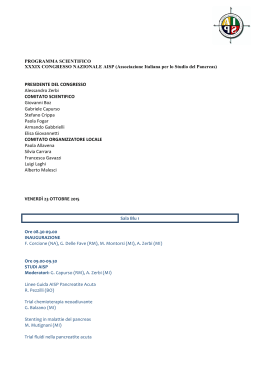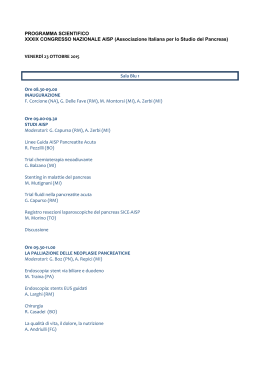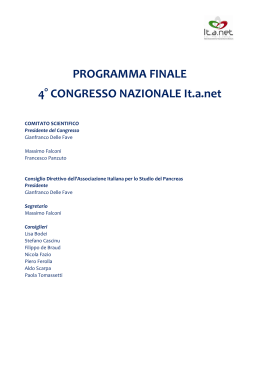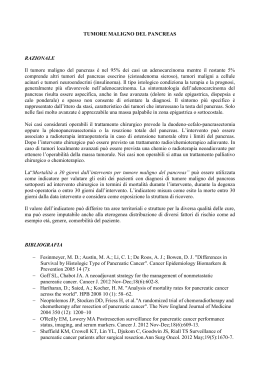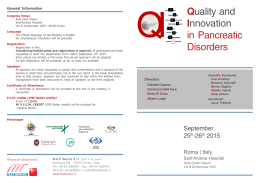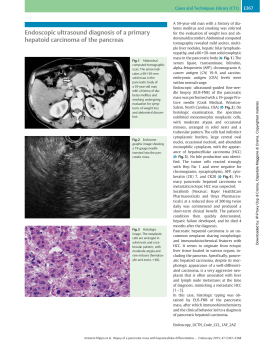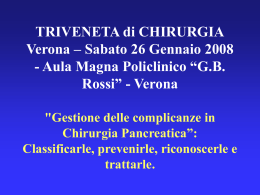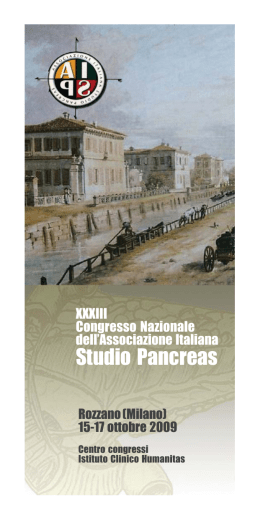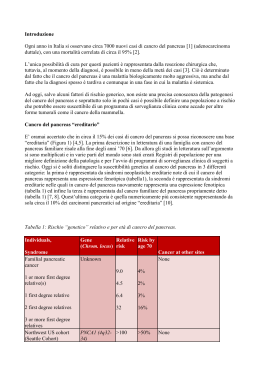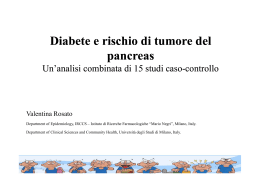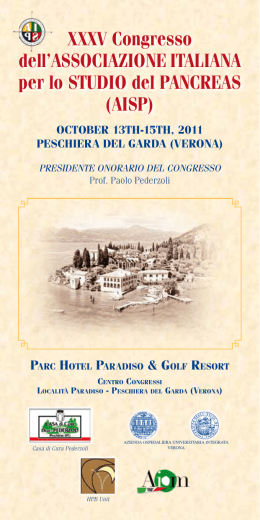PROGRAMMA PRELIMINARE XXXIX CONGRESSO NAZIONALE AISP (aggiornato al 30 luglio 2015) PRESIDENTE DEL CONGRESSO Alessandro Zerbi COMITATO SCIENTIFICO Giovanni Boz Gabriele Capurso Stefano Crippa Paola Fogar Armando Gabrielli Elisa Giovannetti COMITATO ORGANIZZATORE LOCALE Paola Allavena Silvia Carrara Francesca Gavazzi Luigi Laghi Alberto Malesci PROGRAMMA SCIENTIFICO XXXIX CONGRESSO NAZIONALE AISP (Associazione Italiana per lo Studio del Pancreas) VENERDÌ 23 OTTOBRE 2015 Sala Blu 1 Ore 08.30-09.00 INAUGURAZIONE F. Corcione (NA), G. Delle Fave (RM), M. Montorsi (MI), A. Zerbi (MI) Ore 09.00-09.30 STUDI AISP Moderatori: G. Capurso (RM), A. Zerbi (MI) Linee Guida AISP Pancreatite Acuta R. Pezzilli (BO) Trial chemioterapia neoadiuvante G. Balzano (MI) Stenting in malattie del pancreas M. Mutignani (MI) Trial fluidi nella pancreatite acuta G. Capurso (RM) Registro resezioni laparoscopiche del pancreas SICE-AISP M. Morino (TO) Discussione Ore 09.30-11.00 LA PALLIAZIONE DELLE NEOPLASIE PANCREATICHE Moderatori: G. Boz (PN), A. Repici (MI) Endoscopia: stent via biliare e duodeno M. Traina (PA) Endoscopia: stents EUS guidati A. Larghi (RM) Chirurgia R. Casadei (BO) La qualità di vita, il dolore, la nutrizione A. Andriulli (FG) Chemioterapia C. Carnaghi (MI) Radioterapia A. G. Morganti (BO) Discussione Ore 11.00-11.20 Break Ore 11.20-13.00 TAVOLA ROTONDA RICERCA TRASLAZIONALE E ADENOCARCINOMA DEL PANCREAS Moderatori: A. Malesci (MI), A. Scarpa (VR) La fibrosi: ostacolo o possibile target? F. Novelli (TO) Risposta immunitaria P. Allavena (MI) Opportunità dai modelli di colture primarie N. Funel (PI) Infiammazione e markers diagnostici D. Basso (PD) Quale spazio per la Next-Generation Sequencing L. Laghi (MI) Perché le target therapy hanno fallito? E. Raymond (SVIZZERA) Medicina traslazionale in AISP: scenari possibili, una piattaforma comune? L. Piemonti (MI) Discussione Ore 13.00-13.30 SIMPOSIO CONGIUNTO AISP-SID IL CROSS-TALK ACINO-INSULA Moderatori: G. Delle Fave (RM), F. Marotta (MI) Il punto di vista del diabetologo P. Marchetti (PI) Il punto di vista del gastroenterologo R. Pezzilli (BO) Discussione Ore 13.30-14.30 Pausa pranzo & Poster round Moderatori: G. Capurso (RM), S. Crippa (MI) Ore 14.30-15.30 COMUNICAZIONI ORALI Scienza di base Moderatori: P. Fogar (PD), L. Gianotti (MB) Pacetti Moz Picariello Carbone Passacantilli Funel Tacelli Tavano Association of AKT1 and SELP Polymorphisms with Cachexia and Survival of Patients with Pancreatic Cancer Blood expression of Matrix Metalloproteinases 8 and 9 and of their inducers S100A8 and S100A9 supports diagnosis and prognosis of PDAC-associated Diabetes Mellitus Pancreatic Stellate Cells promote pluripotency in pancreatic cancer cells Combined inhibition of IL1, CXCR1/2, and TGFβ signaling pathways modulates in vivo acquired resistance to anti VEGF treatment. ZEB1 Regulates DNA Damage Response During Gemcitabine Treatment in PDACs Cells TGF-β/EGFR AUTOCRINE CROSS-TALK AFFECTS EMT PROCESS AND MIGRATION IN 3D TISSUE-ENGENEERED MODEL OF PANCREATIC DUCTAL ADENOCARCINOMA Epithelial-to-Mesenchymal Transition (EMT) and Pancreatic Cancer progression Digital quantification of microRNA in plasma for early diagnosis of pancreatic cancer Ore 15.30-16.30 UTILIZZO DI RMN (risonanza magnetica nucleare) ED EUS (ecoendoscopia) IN SITUAZIONI CLINICHE PARTICOLARI Moderatori: L. Calculli (BO), M. Falconi (MI) Screening cancro familiare: stato dell’arte J.W. Poley (PAESI BASSI) Screening cancro familiare: la situazione in Italia M. Del Chiaro (SVEZIA) Follow-up IPMN: perché con EUS S. Carrara (MI) Follow-up IPMN: perché con MRI R. Salvia (VR) Come validare le linee guida italiane: lo studio PANCY E. Buscarini (CR) Discussione Ore 16.30-17.00 Break Ore 17.00-18.00 COMUNICAZIONI ORALI Malattie infiammatorie del pancreas Moderatori: G.M. Cavestro (MI), S. Crippa (MI) Marchegiani The Risk of Malignancy in 1,712 Patients Resected for Intraductal Papillary Mucinous Neoplasms (IPMN) of the Pancreas: A Report from the Pancreatic Surgical Consortium Crippa Low Progression Of Intraductal Papillary Mucinous Neoplasms With Worrisome Features And High-Risk Stigmata Undergoing Non-Operative Management: A MidTerm Follow-Up Analysis Value of Magnetic Resonance Diffusion-Weighted Imaging in the Evaluation of Pancreatic Neuroendocrine Neoplasms Prevalence of Chronic Pancreatitis: Preliminary Results of a Primary Care Physicians based Population-Study Bile Duct Involvement in Autoimmune Pancreatitis: Clinical Features and Prognostic Aspects in 92 Patients Endoscopic Ultrasonography May Select Subjects Having Chronic Asymptomatic Pancreatic Hyperenzymemia Who Require A More Strict Follow-Up Comparison of Capillary vs Aspiration Technique in Endoscopic Ultrasound-guided Fine Needle Aspiration (EUS-FNA): a Preliminary Report A Multimodal, One-Session Endoscopic Approach for Management of Patients with Advanced Pancreatic Cancer. De Robertis Capurso Campagnola Antonini Dabizzi Manta Ore 18.00-18.30 ASSEMBLEA SABATO 24 OTTOBRE 2015 Sala Blu 1 Ore 08.30-09.30 LA PANCREASECTOMIA TOTALE Moderatori: C. Bassi (VR), G. Uomo (NA) Indicazioni e aspetti chirurgici P. Di Sebastiano (CH) La gestione dell’insufficienza esocrina totale M. Piciucchi (RM) La gestione del diabete A. Secchi (MI) Discussione Ore 9.30-10.30 COMUNICAZIONI ORALI Carcinoma del pancreas Moderatori: G. Balzano (MI), S. Massironi (MI) Archibugi Palini Cosi Castino Frampton Giordano Comito D'Onofrio Aspirin, Statins, and Their Combined Use Do Not Reduce The Risk of Pancreatic Cancer Early detection of pancreatic cancer in high risk population: experience of a medical – nursing managed screening ambulatory. Familial Pancreatic Cancer In A Population Of Hospitalized Patients Dual Prognostic Significance of Tumor Associated Macrophages in Human Pancreatic Adenocarcinoma Treated or not with Chemotherapy THE MICRORNA PROCESSING ENDORIBONUCLEASE DICER HAS ALTERED EXPRESSION IN PANCREATIC DUCTAL ADENOCARCINOMA AND PROGNOSTIC IMPLICATIONS Nab-Paclitaxel (Nab-P) and Gemcitabine (G) as First Line Chemotherapy (CT) in Advanced Pancreatic Cancer (APDAC) Patients (pts): an Italian “Real Life” Study What role for stereotactic body radiotherapy (SBRT) in the treatment of pancreatic cancer? Clinical results of a phase II study Percutaneous Ultrasound-Guided Radiofrequency Ablation (RFA) of Pancreatic Ductal Adenocarcinoma Ore 10.30-11.00 Break Ore 11.00-11.30 AISP INCONTRA EPC: PANCREAS 2000 Moderatori: G. Capurso (RM), M. Del Chiaro (SVEZIA) Storia del progetto M. Del Chiaro (SVEZIA) Prospettive attuali e future G. Capurso (RM) Esperienze vissute e discussione Ore 11.30-12.00 PANCREATITE DA IPERTRIGLICERIDEMIA Moderatori: E. Giovannetti (PI), P. A. Testoni (MI) Incidenza, problematiche cliniche ed approccio terapeutico L. Frulloni (VR) Nuove possibilità terapeutiche: terapia genica nei pazienti portatori di mutazioni della lipoproteinlipasi C. Zambon (PD) Discussione Ore 12.00-13.00 COMUNICAZIONI ORALI Chirurgia del pancreas Moderatori: P. De Rai (MI), A. Gabbrielli (VR) Nappo Milanetto Andrianello Sandini Giardino Uccelli Bissolati Taffurelli Lymphadenectomy for periampullary cancer: prognostic role of different metastatic nodal stations and of the number of metastatic lymph nodes Central Pancreatectomy: Experience with 129 consecutive Patients Treated in Two European Pancreatic Centers Pancreaticojejunostomy After Pancreaticoduodenectomy: Suture Material and Incidence of Post-Operative Pancreatic Fistula Preoperative Computed Tomography to Predict and Stratify the Risk of Severe Pancreatic Fistula after Pancreatoduodenectomy C-Reactive Protein and Procalcitonin as Predictors of Postoperative Complications after Pancreaticoduodenectomy: a Prospective Study Readmission After Pancreaticoduodenectomy In An Italian Setting Spleen-Preserving Pancreatic Resections with Preservation of Splenic Vessels: a Cautionary Note on the Risk of Vascular Complications Laparoscopic distal pancreatectomy in benign or premalignant pancreatic lesions: is it really more cost-effective than open approach? Ore 13.00-13.30 PREMIAZIONE E CHIUSURA CONGRESSO
Scaricare
